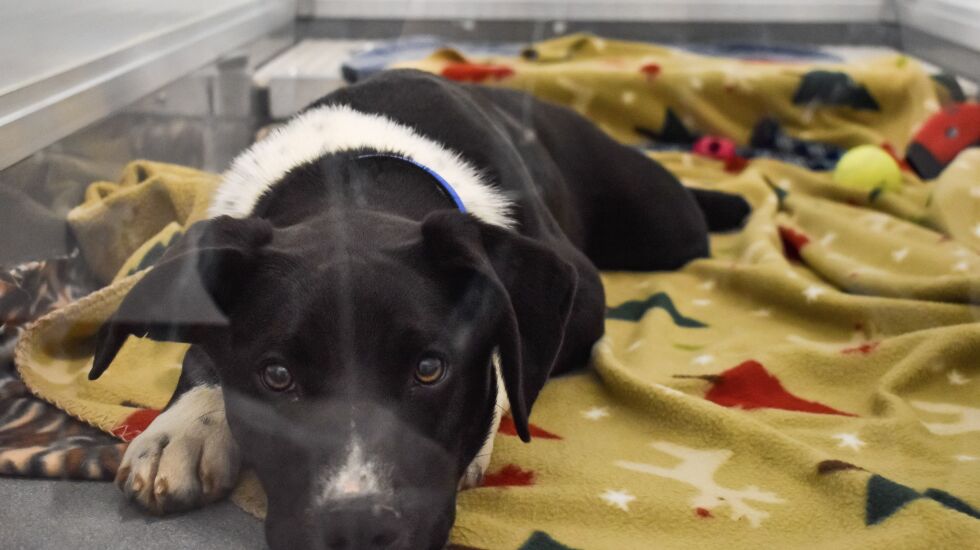
Chicago animal shelters are at capacity as adoption rates slow and pet owners deal with steep costs for animal care and supplies, housing issues and medical emergencies, local experts say.
“We’re really in the thick of a surge in homeless pets in not only Chicago, but also nationwide,” said Susanna Wickham, the CEO of PAWS Chicago, the city’s largest no-kill shelter.
There was a rise in demand for pets three years ago at the start of the COVID-19 pandemic, Wickham said. But that slowed down in part because people started taking their pets to shelters and breeders have been dropping off boxes of puppies at the city pound because they can’t sell their litters.
Owners are also struggling with the cost of veterinary care and the price of animal care in general. A nationwide shortage in veterinarians has made vet care cost much more, she said.
That shortage likely won’t relent any time soon. A gap of up to 24,000 veterinarians will likely still exist by 2030, according to a study from Mars Veterinary Health.
Meanwhile, spending on pet health care is estimated to increase 3-4% per year beyond inflation over the next 8 to 10 years, the study found.
PAWS has about 500 animals in its program at a time, roughly half and half cats and dogs. Of those, nearly half are patients in its medical center, nearly half are in foster homes and about 80 are in the organization’s shelter.
Darlene Duggan, COO of Chicago-based Anti-Cruelty Society, said the shelter is at 100% capacity.
After adopting pets spiked in the early days of the COVID-19 pandemic, many owners started returning those animals in 2021, Duggan said. The shelter, which tries to operate at 75%, continues to deal with the effects of that trend.
“Coming out of the pandemic, about two and a half years ago, our operations were completely turned on its head,” Duggan said. “Before that, we would always run our shelter at about 75%. We always wanted to keep our kennels open in case of an emergency.”
The Anti-Cruelty Society has experienced an increase in people reaching out to relinquish a pet. But Duggan said the larger issue is not enough animals, especially large breed dogs, are being adopted.
One long-term solution to overcrowded shelters is wider access to spaying and neutering, Wickham said. PAWS offers spay and neuter procedures to owners at a reduced cost or for free. So far this year, the organization has done 16,000 procedures.
“It’s a foundational long-term solution to reducing pet overpopulation, especially with outdoor animals,” Wickham said.
This year, the PAWS clinic that provides spay and neuter procedures started operating five days a week, up from four.
Large breed dogs are among the more difficult to get adopted.
“In a city, it’s harder to find people able to adopt a dog over 40 pounds. Housing is the biggest reason why. Breed and size restrictions are a common thing in multi-unit housing,” Wickham said.
PAWS also helps Chicago Animal Care and Control manage the city pound’s population. It provides spay and neuter procedures for many of the larger dogs up for adoption, as many as 10 to 15 a week, she said.
Some area rescues don’t have veterinarians on staff so PAWS will often perform procedures for their animals, including spaying and neutering.
“We play a unique role for the city,” she said. “It’s not just about the animals in our population; we also help the city and other rescues, especially for spaying and neutering.”
PAWS recently started collecting data measuring why people are giving up their pets.
“We really try to help keep pets and their owners together,” Wickham said. “Often it’s just providing help in an emergency, addressing a medical need, a training need. That way we can keep these animals with their families.”
The Anti-Cruelty Society also provides services to people who might be struggling with pet ownership but don’t want to relinquish their animal. They’ll help cover the cost of a medical procedure, provide resources on training or offer pet food from their pantry, Duggan said.
To address overcrowding, the shelter has waived all adoption fees in December to make it more accessible for people to adopt a pet, Duggan said.
“That promotion has been really helpful. We’re getting a lot of animals into homes for holidays,” she said.
Two parents stopped by Wednesday to adopt a puppy for their children, Duggan said.
“We were very excited about that,” she said. “There are going to be some lucky kids waking up to a new buddy Christmas morning.”







